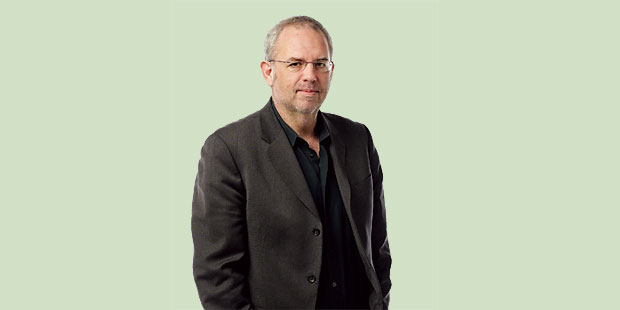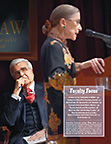Introducing Robert Howse
Lloyd C. Nelson Professor of International Law
Printer Friendly VersionAsked who was most influential in shaping his illustrious academic career, Professor Robert Howse ran down a list of people before answering with a “thing”—the typewriter.
Howse had difficulty reading and writing until about age nine, when he learned how to form words on a typewriter based on the spatial organization of the keyboard. “All of a sudden there was this great sense of liberation,” says Howse, who has since learned he is dyslexic. “The sense of empowerment from overcoming that kind of obstacle may have put me into overdrive.”
An understatement indeed.
Soon Howse was a voracious reader, tackling serious literature. Though he still suffers from aspects of dyslexia—he can’t drive a car—he now reads Plato in the original Greek (albeit slowly), writes extensively on 20th-century political philosophers Leo Strauss and Alexandre Kojeve, is an expert in international trade law, and has shaped public policy in issues ranging from human rights to global warming. “He’s a rare combination of somebody who knows international trade and investment law in detail, yet he’s got a broad-ranging and creative intellectual outlook,” says Richard Stewart, the John Edward Sexton Professor of Law.
Howse joined the faculty in June from the University of Michigan Law School, where he taught international law and legal and political philosophy. A full-time academic, he also has a high profile in public policy circles—he writes prolifically and has advised government agencies and international organizations, such as the Organisation for Economic Co-operation and Development, and the United Nations Office of the High Commissioner for Human Rights.
“Rob fully understands the policy and political context in which trade decisions are made, and this sets him apart from many academics in the international trade area,” says Susan Esserman, chair of the international department at D.C.-based Steptoe & Johnson and a former deputy U.S. trade representative. “He has a great eye for emerging issues in the field, and he is endlessly creative,” says Esserman, who has written with Howse for the Council on Foreign Relations’ Foreign Affairs magazine and The Financial Times.
He’s best known for cowriting The Regulation of International Trade (Routledge, 1995), a comprehensive look at the evolution of international trade theory and policy, which included analysis of the General Agreement on Tariffs and Trade and the World Trade Organization.
Currently, he’s juggling a number of projects. Having been the principal trade expert for the Renewable Energy and International Law Project (a consortium with Baker & McKenzie and Yale University), he recently attended the first high-level policy meeting exclusively focused on climate change and trade, organized by the Danish Ministry of Foreign Affairs. He is collaborating with Ruti Teitel, Ernst C. Stiefel Professor of Comparative Law at New York Law School, on a series of projects that analyze the debate on globalization in relation to the human rights revolution in international law. He’s writing a book tentatively called Rehearing the Case of Leo Strauss. In 2004, he self-published Mozart: A Novel, and he’s currently writing another piece of fiction.
Raised non-religious by parents of Protestant origin, mainly in a predominantly Orthodox Jewish neighborhood of Toronto, he became fascinated with philosophy. “I had a sense of wonderment about the different ways of leading our lives that came from this experience of otherness around me,” he says.
In 11th grade, after being removed from his history class for misbehavior, he was put into an independent study. “I used this chance to study the themes that interested me, including the religious versus the secular life,” he says. He came upon Strauss, one of many figures who influenced his career.
Howse entered the University of Toronto to study Straussian thought under the philosopher (and soon to be best-selling author) Allan Bloom. He graduated in 1980 with a B.A. in philosophy and political science. When Bloom left for the University of Chicago, Howse enrolled there, hoping to earn a master’s degree. But Howse, who was politically left-leaning, left Chicago disillusioned after a few disagreements with Bloom and his neoconservative followers.
In 1982, he joined the Canadian diplomatic service. “[There] I developed a fascination for law as a discourse of diplomacy in international politics,” says Howse. As a member of the Policy Planning Secretariat, Howse worked on then-Prime Minister Pierre Trudeau’s global peace initiative. And as the Canadian Cultural attaché in Belgrade, he promoted Canadian rock-and-roll while also working on the former Yugoslavia’s debt refinancing negotiations.
He returned to the University of Toronto, earning a law degree in 1989 and a master’s from Harvard in 1990. Howse started teaching at the University of Toronto, where he stayed until joining the University of Michigan Law School in 1999. He’s had a long-standing relationship with NYU, which Howse is ready to formalize. As his research has moved increasingly in the direction of foundational and conceptual questions in international law, “NYU has seemed the logical center,” he says, citing his interest in the history and theory of international law program. Moreover, his recent focus on climate change and trade is an excellent fit with the Global Administrative Law Project. On leave for the fall, he’ll teach international investment law and the history and theory of international law in the spring.
Howse is undergoing a divorce, and has no children. In keeping with his public policy positions, he leads a consciously responsible lifestyle—biking and walking whenever possible and buying organic. “I know from my research there are tradeoffs,” he says, “but overall, I think that the result is greener than otherwise.”
—

